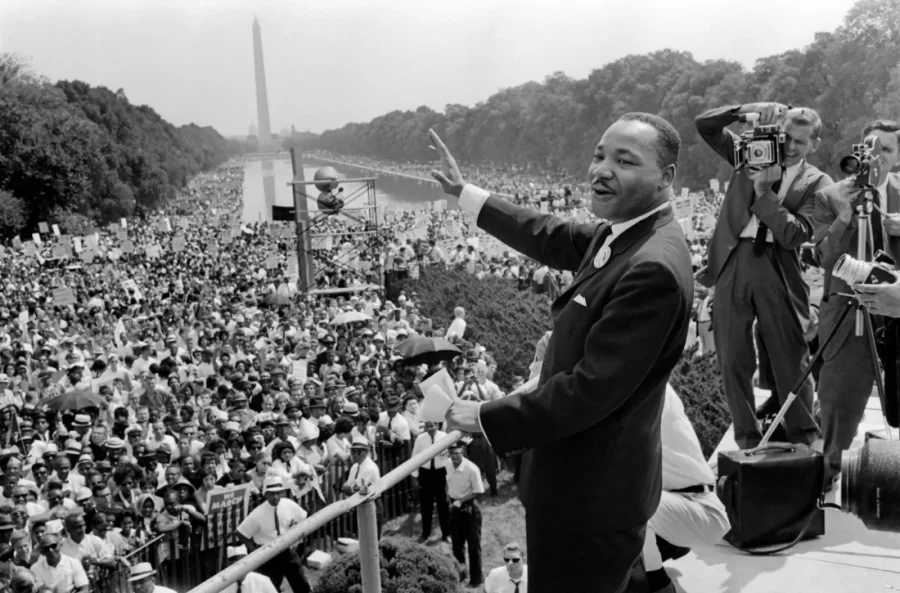
Mahatma Gandhi, Martin’s Dream, Co-Existence & Basudhaiva Kutumbakam!
In the footsteps of the great Mahatma Gandhi, Martin Luther King, Jr.—solely depending on principles of nonviolent resistance against social evils—led the civil rights movement. Inspired by Mahatma Gandhi’s philosophy, MLK articulated his vision of the beloved community, wherein the freedom of each would be intertwined with the well-being of all. The world would be filled with harmony and peace. I am grateful to the editor of Philosophers’ Magazine for this indication of our philosophy being overlooked in the UK, as I write this quite optimistically from the highlands of Darjeeling. With the hopes of the great MLK in mind, this article juxtaposes his philosophy with my views in the present context.
From murkier issues of the Black Lives Matter movement to pressing matters of gun control—all are burning issues for the fabric of American society, as we speak. As an extension, though I attempt to stick to my philosophical orientation, I shall think of issues relating to Indian and Nepalese politics and problems of societal discrimination. I shall use related data from my country. From a philosophical viewpoint, we will trace back co-existence (Basudhaiba kutumbakam), find parallels with Vasudhaiva Kutumbakam, and locate them within the realm of Martin’s dream and emancipatory theory.

Photo: AFP
Martin Luther King Jr. and Mahatma Gandhi:
An Inspirational Connection:
Gandhi’s concepts of nonviolent resistance showed Martin Luther King Jr that he was ‘not alone in his conviction that the way of love and nonviolent protest is the most potent weapon available to overcome the cruel arrogance of the oppressor’. Gandhi challenged the prevailing patriotic techniques in wresting social change, using a novel approach of nonviolence. Both leaders proclaimed the moral and political duty of free men to fight for justice and equality while encouraging non-participation in violent acts of rebellion. The harmonies in their philosophy pointed to the human universals in the struggle for liberation from oppression.
Co-Existence and Martin’s Dream:
The philosophical idea of co-existence that suggests ‘Vasudhaiva Kutumbakam’ or that ‘the world is one family’ echoes the American civil rights activist Martin Luther King Jr’s dream of a society where all will live together. This concept is at the core of the ancient Indian idea of ‘jiva’ (life, being) in which all the individuals, human and nonhuman, are ultimately one – and therefore should be treated with empathy, understanding, and compassion for the sake of harmonious co-existence.
Imagining a world where the human race, taken as a whole, is united in the face of diversity unable to divide, race, religion, color, caste, or creed among humankind becomes meaningless. Co-existence becomes the norm where everyone regardless of whether you believe in the Supreme, Supreme Being, the Eternal, Adam, Bushra (R), GOD, Allah, Brahma, Haqq, ibn Mannan, Imam-i-Hussain, err-Rahim, Yahweh, Anooshtebêh so long as they submit to the principles of the welfare, harmony of human race irrespective of socio-economic status. Co-existence, viewed from the charming story of the ants and the ox, finding each other having built their corner of the Transcendence, aiming for a common celestial ground. Martin’s dream reflects Vasudhaiva Kutumbakam, a global family that transcends all differences on the thread of justice, equality, and mutual respect.

Vasudhaiva Kutumbakam- The World Is One Family:
A phrase from the Sanskrit – ‘Vasudhaiva Kutumbakam’ – appears in the Hindu scripture the Maha Upanishad, and translates as ‘The World Is One Family’, which speaks to a view of the world as a family, or a community of shared interdependence and interests, as does Martin Luther King’s assessment of our ‘global village’. The phrase is so old, and the idea so crucial to India’s history, that it’s engraved into the front hall of the Parliament of India: ‘The whole world is a family. Live in such a way that even a stranger would feel like kin.’ From the Maha Upanishad.
Emancipatory Theory and Co-Existence:
Current State of American Society:
We can think of the emancipatory theory advocated by liberation theologians such as Martin Luther King Jr as being based on a co-existence philosophy – insofar as it emphasizes the possibility of true emancipation not merely from domination but also oppression as the precondition for real freedom.
In the co-existence model, the freedom of one community is intertwined with the freedom of all. King’s call to end racial injustice and his monumental interest in economic equality reflect the interdependence of communities within the human family. To study today’s American society is to conclude that although, since the time of Martin Luther King, there have been significant changes for the better, there is yet still much to strive for. The Black Lives Matter movement was formed recently to become a contemporary civil rights movement, reminiscent of those in the former time of King’s activism.
It is no less urgent now, with today’s gathering sympathy for the struggle of African Americans to be recognized, regarded, and dealt with fairly as equals within a society still marked by racial injustice and discrimination. From recent data, we see that, across many of life’s domains, including work, academics, and the police, discrimination against the African American population is still rampant. The gun violence issue in the USA, a key topic of social debate, is made worse by the fact that minorities tend to suffer from it much more than white people. Not so much women as men do.
Indian Politics and Societal Issues:
Like Indian politics, which saw the role of Mahatma Gandhi during India’s independence struggle against British colonial rule, today’s modern India is faced with silences of social discrimination. Many of the caste divisions that were part of Gandhi’s call for independence still manifest today. Recent statistics highlight that, despite anti-discriminatory legislation, those who are discriminated against based on caste live in pockets of social and economic disease.
Large problems of political ethics plague Nepali and Indian politics as well, from a lack of character in political discourse to ministers not stepping down in the face of corruption allegations, or politicians not being ‘responsive’ to the direction and leadership of the nation. This moral void affects the quality of democratic functioning and the legitimacy of the state.
Lessons for Nepali people Nepalese Politics and Society:
Learning from the American and Indian experiences, the Nepalese experience with moral ethics in politics shows us that it is critical to insist on the moral virtues of accountability, and transparency and to build a sense of commitment to the public good in political morality for a healthy democracy and for the welfare of citizens.
But for the Nepali community, particularly the Nepalese American community, we have to connect Dr MLK Jr as an example for people who struggle and an example for people who are trying to move forward …He stood for a lot of what we still stand for – the common struggles of human life and human rights … There is a lot of violation of rights happening, not just in Nepal, but in many places … It is good for the minority and it is really good for people who are struggling every day. People who are struggling must stand together.
To summarize, Dr King’s dream and legacy inspire movements across the globe as we all grapple with the problems of secure justice and equity. While things are much different from when Dr King was alive, the struggle for equality continues to hurt many sectors of US society and is rooted in the same human indignities that are represented elsewhere in our contemporary global struggles against discrimination. The ethos of Dr King’s principles, the idea of co-existence, and Vasudhaiva Kutumbakam create an ethical map to help understand society and its problems both at home and abroad, such as in the case of Nepalese and Indian politics. Dr King’s dream and the spirit of co-existence is an ethic for action for a more just, inclusive, and caring world.
(Note: Luitel Jee serves as the Advisor Editor for eNepalese.com and is currently pursuing a doctoral fellowship.)
Comment